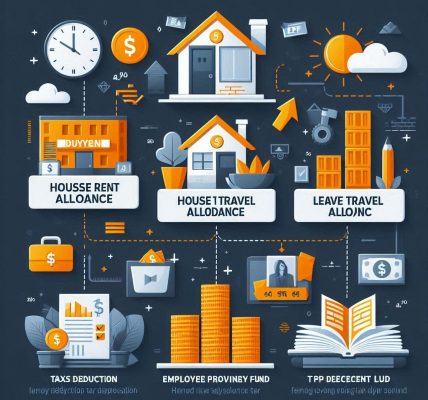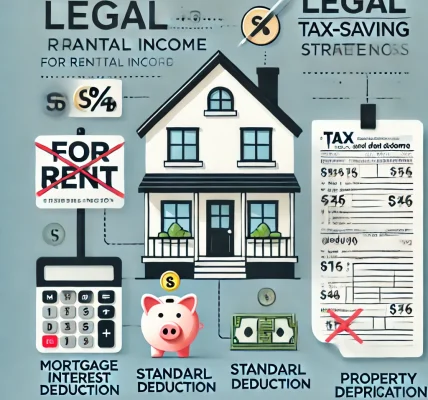Owning rental property can be a great source of income, but it also comes with its own set of tax obligations. As a landlord, you’re required to report your rental income to the IRS, and you may be subject to taxes on that income. However, there are various strategies that landlords can use to reduce taxes on rental income and optimize their financial outcomes.
In this blog, we’ll break down effective tax-saving strategies for rental income and guide you through deductions, credits, and other methods that can help lower your tax liability.
1. Understand the Basics of Rental Income Taxes
Before diving into tax reduction strategies, it’s important to understand how rental income is taxed. According to the IRS, rental income is the money you receive from tenants in exchange for renting out your property. This includes:
- Rent payments: Monthly or weekly payments from tenants.
- Security deposits: If you don’t return the deposit, it may be considered income.
- Other payments: Payments for things like parking, utilities, or storage.
You must report all rental income on your tax return, but you can offset it with certain expenses that can be deducted from your taxable income. The net rental income (after deductions) will be taxed based on your overall income.
2. Claim Property Expenses as Deductions
One of the best ways to reduce your rental income tax is by taking advantage of deductions. The IRS allows landlords to deduct various expenses related to the maintenance and management of rental properties. Some of the most common deductible expenses include:
a) Mortgage Interest
If you have a mortgage on your rental property, the interest you pay on that mortgage is deductible. This can be a significant deduction, especially in the early years of a mortgage when the interest payments are higher.
b) Property Taxes
Property taxes are another common deduction that can reduce your taxable rental income. You can deduct the amount you pay in property taxes for each rental property you own.
c) Repairs and Maintenance
Costs associated with maintaining your rental property are deductible. This includes:
- Repairing leaky faucets, fixing broken appliances, or replacing a damaged roof.
- General upkeep such as landscaping, pest control, and cleaning.
Note that improvements (like a new kitchen or addition to the property) are not immediately deductible but can be depreciated over time (more on that later).
d) Insurance
Landlords can deduct the cost of insurance premiums for their rental properties. This includes landlord insurance, property insurance, and liability insurance.
e) Property Management Fees
If you hire a property management company, you can deduct the cost of their services. These fees may include rent collection, maintenance services, advertising the property, and handling tenant issues.
f) Utilities
If you pay utilities (such as water, gas, or electricity) for your rental property, these costs can be deducted as business expenses.
3. Depreciate Your Property
Depreciation is one of the most powerful tax-saving tools available to landlords. The IRS allows you to deduct a portion of the cost of your property over time, even though it may still be appreciating in value. This is because the IRS considers real estate to be a long-term asset that will wear down over time.
Here’s how depreciation works:
- You can depreciate the value of the building (not the land) over 27.5 years for residential properties.
- Each year, you can deduct a portion of the property’s value, which reduces your taxable rental income.
For example, if you purchased a rental property for $275,000 (with $225,000 allocated to the building and $50,000 for the land), you could depreciate $225,000 over 27.5 years, which would give you a deduction of approximately $8,182 per year.
This depreciation deduction can help offset rental income, reducing the amount of taxable income you have to report.
4. Utilize a 1031 Exchange for Property Sales
A 1031 Exchange is a powerful tax strategy that allows you to defer paying capital gains taxes on the sale of an investment property. Here’s how it works:
- When you sell a rental property, you usually have to pay taxes on any capital gains (profit from the sale).
- However, by completing a 1031 Exchange, you can reinvest the proceeds from the sale into a like-kind property (a similar investment property), and defer paying capital gains taxes on the transaction.
This strategy is particularly useful if you’re planning to sell a property and use the proceeds to purchase another property. It allows you to defer taxes until you sell the new property, giving you more capital to reinvest.
5. Take Advantage of the Qualified Business Income (QBI) Deduction
Under the Tax Cuts and Jobs Act (TCJA), landlords may be eligible for the Qualified Business Income (QBI) deduction. This deduction allows you to deduct up to 20% of your rental income if your rental activity qualifies as a business (as opposed to just passive investment).
To qualify for the QBI deduction, your rental activities must be substantial. This includes:
- Actively managing the property.
- Providing services such as cleaning, maintenance, or furnishing the property.
- Renting out multiple properties or operating a real estate business.
If you qualify, the QBI deduction can provide a significant reduction in your tax liability.
6. Keep Track of Depreciation Recapture
When you sell a rental property, you’ll need to account for depreciation recapture. This means that any depreciation you’ve claimed over the years will be taxed as ordinary income (at a rate of up to 25%).
While depreciation is a valuable tool for reducing taxes while you own the property, keep in mind that you will need to pay taxes on the accumulated depreciation when you sell. However, you can still reduce your overall tax burden by utilizing strategies like the 1031 Exchange to defer the depreciation recapture tax.
7. Consider Incorporating Your Rental Business
In some cases, it may be beneficial to incorporate your rental property business. By forming an LLC or another type of business entity, you may be able to take advantage of tax benefits such as:
- Business deductions: You may be able to deduct business-related expenses such as marketing, legal fees, and travel.
- Liability protection: Incorporating can help separate your personal and business assets, reducing your personal liability in case of lawsuits.
However, incorporating your rental business can be complex and may come with additional administrative and filing requirements. It’s important to consult with a tax advisor or attorney before making this decision.
8. Hire a Tax Professional
Navigating the complexities of rental income taxation can be challenging, especially if you have multiple properties or significant deductions. A tax professional can help ensure that you’re taking full advantage of the available tax-saving opportunities and can guide you through strategies like depreciation, the QBI deduction, and 1031 Exchanges.
A tax professional can also help you stay compliant with tax laws and avoid costly mistakes that could lead to penalties or audits.
9. Conclusion
Reducing taxes on rental income is not only about managing your expenses but also about taking advantage of the various tax strategies available. By properly deducting expenses, using depreciation, utilizing 1031 Exchanges, and considering tax credits, you can significantly reduce your taxable rental income and improve your overall financial position.




